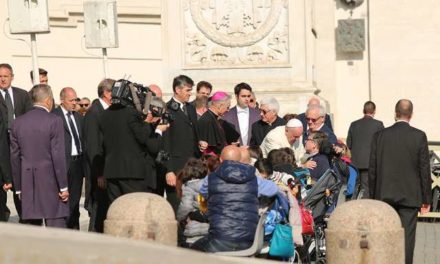
Reject intolerance, teach respect for other religions, speakers say


File photo shows Cardinal Leonardo Sandri, prefect of the Congregation for Eastern Churches, leads a prayer during an ecumenical service at the Omni Shoreham Hotel in Washington, Sept. 9. 2014. TYLER ORSBURN/CNS
ROME— A rigorous defense of religious freedom around the globe must be accompanied by the efforts of religious communities and governments to teach people to respect other faiths and to see diversity within a society as a value, not a threat, said a Vatican cardinal and a top British government official.
“The struggle for the affirmation of religious liberty is far from being won,” Cardinal Leonardo Sandri, prefect of the Congregation for Eastern Churches, told an audience at Rome’s Pontifical Gregorian University Jan. 30.
The cardinal shared the dais with Lord Ahmad of Wimbledon, the British minister of state at the Foreign and Commonwealth Office for Counter-Terrorism and Violent Extremism, Freedom of Religion and Belief. The conversation was sponsored by the British Embassy to the Holy See.
With his responsibility for the Eastern Catholic Churches throughout the world and for all Catholics in the Middle East, Cardinal Sandri said he has seen beautiful examples not only of peaceful coexistence, but of real community-building and cooperation between members of different religions.
At the same time, he said, he has seen the “great suffering when some basic rights of the human person — and, first of all, that of religious liberty — are violated or insufficiently guaranteed.”
He told the story of teenager he called Youssef. The young Iraqi was baptized and raised a Christian, but after his mother married a Muslim, the whole family was listed as Muslim in the government registry and on their identification cards. He cannot “correct” the listing, the cardinal said, “because in modern Iraq, after the two Gulf wars, the possibility of changing religions is not foreseen.”
Cardinal Sandri also insisted that full religious freedom includes the right to conscientiously object to abortion and other “biomedical practices that go against one’s deepest convictions.”
At the same time, the cardinal said, Catholics must remember how many centuries it took the church to recognize religious freedom as a basic human right for all people of every faith or no faith.
Such recognition came only in 1965 with the Second Vatican Council’s declaration “Dignitatis Humanae,” the cardinal said, so instead of condemning others who struggle to recognize the rights of others to believe differently, the Catholic Church must patiently encourage them.
Lord Ahmad urged “intolerance of intolerance,” but also pointed to education as the key in promoting respect and interreligious harmony.
A Muslim educated in Anglican schools, Lord Ahmad now has two children in Catholic schools, because of the way those schools teach “the ethos of faith as a force for good,” he said.
“Children learning from other faiths doesn’t dilute their faith; it doesn’t make me or my children less Muslim,” he insisted. “It makes us more rounded, it makes us more passionate and it develops a deep-rooted understanding that faith is a route that we follow.”
“Intolerance is something that is learned,” he said. “We must educate children to understand other religions in the hope that the next generation will be wiser than those that have come before them.”
But for governments, he insisted, a lack of religious freedom must not be tolerated whether it is Myanmar’s treatment of the Muslim Rohingyas, Iran’s treatment of Baha’is, China’s treatment of all believers, Saudi Arabia’s treatment of all but Muslims or Pakistan’s blasphemy laws, which can be manipulated to punish anyone who is not Muslim.
“It would be wrong to suggest that it always has been easy to integrate religious minorities into a society” where there always has been a dominant religious tradition, he said. “When we promote religious tolerance in other countries, we know from experience how challenging this really is.”
“When a temple is built on your street or a halal butcher shop opens in the market,” he said, “it forces you to accept that your religion is one of many and not the only one.” CATHOLIC NEWS SERVICE









